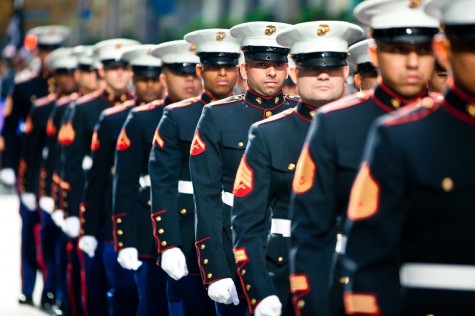Veterans continue with their service
May 20, 2015
 DVIDSHUB/Flickr
DVIDSHUB/Flickr
After deployment, veterans are often subjected to nightmares, flashbacks, mood swings and panic attacks; symptoms of post-traumatic stress disorder that can haunt them for years.
Veterans of war still feel the effects of combat, even after their service has ended. The wounds of war never heal, just scab over. Oftentimes, the most mundane things can be a reminder of a veteran’s time in the military.
“The sacrifice doesn’t stop for combat people,” Dan Tofflemire, retired Vietnam combat medic 25th Infantry Division and purple heart recipient, said. “It will go on for a lifetime.”
Letting go of basic freedoms granted to U.S. civilians is one of the easier sacrifices to make; the real sacrifice is the consequences of war, Tofflemire said. The true sacrifices begin from the point when soldiers leave the service and from there, it never stops.
Tofflemire continues to be compensated for the ailments that were inflicted during his service in Vietnam. He said it is these ailments which are his continued sacrifice.
Veterans of the Vietnam war continue to keep their memories locked up, which doesn’t always make dealing with them any easier. Because of strong public opinion against the Vietnam war, many veterans didn’t feel comfortable being open about their service.
“Nobody was for us; our country turned their back on us,” Bill Davis, retired Vietnam infantry and purple heart recipient, said. “[The] only people who were for us were our family.”
On television, news channels will occasionally show the homecoming of soldiers, dressed in fatigues, receiving a warm welcome. This was not the case for many coming home from Vietnam.
“We wore civilian clothes home,” Davis said. “Put everything in the closet and tried to believe it never happened.”
Even those who didn’t serve in combat still made sacrifices for their country.
Soldiers give up a lot of control over their lives, Toffelmire said. They’re always told what to do, when to do it and how to do it. The military doesn’t ask for the soldier’s cooperation, they demand it.
“In basic training, when you go in, they cut all your hair off and give you all the same clothes,” Jim Bashaw, Army 7th Infantry Division veteran, said. “Can’t have people thinking on their own.”
Bashaw noted that a certain amount of individuality is often allowed, but in order for the military to work properly, all of these sacrifices are necessary.
And for putting their life on the line, many soldiers are not paid well. While Tofflemire was in basic training, he said there was a sad truth in a commonly told joke.
“The joke was that a parking meter makes more money,” Tofflemire said.
How much a soldier sacrifices is relevant to how much they have put on the line, Tofflemire said. For those who have served in combat, it is their life.


